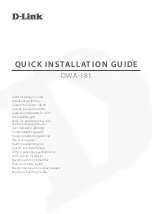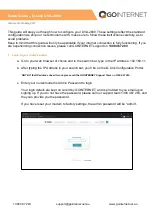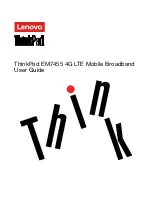
43
Connecting the Cable Modem
1.
Connect one end of the coaxial cable to the cable connection in the wall, and the other end
to the connector on the modem labeled CABLE.
2.
a.
Insert the plug from the AC power supply into the power AC jack on the cable modem.
b.
Insert the power cord into the AC adapter, and then plug into an AC outlet.
3.
For USB Connection:
Connect one end of the USB cable to the USB port on the back of
your computer, and the other end to the USB port on the cable modem’s back panel.
(See
page 9 for instructions on loading the USB driver.)
OR
For Ethernet Connection:
Connect one end of the Ethernet cable (straight-wired, see
above) to the Ethernet port on the back of your computer, and the other end to the
ETHERNET jack on the modem’s back panel.
Minimum System Requirements
Quick Reference
IBM PC COMPATIBLE
MACINTOSH
CPU
Pentium preferred
PowerPC or higher
System RAM
16MB (32MB preferred)
24MB (32MB preferred)
Operating System
Windows 98SE/2000/Me/XP, Linux
Mac OS 7.6.1 or higher
Available Disk Space
125MB
50MB
Sound Card
Preferred
N/A†
Video
VGA or better (SVGA preferred)
VGA or better (SVGA built-in preferred)
CD-ROM Drive
Required for USB
Required
Ethernet
10BaseT or 100BaseT
10BaseT or 100BaseT
USB Port
USB (Windows 98SE/2000/Me/XP only) N/A†
The Universal Serial Bus is a high speed bus that enables your computer to
communicate simultaneously with a variety of peripherals. If you have other
peripherals that send and receive a lot of information, such as speakers, printers or
scanners, we recommend using an Ethernet card to support this modem.
†
Mac Users: Mac OS or any other OS other than Windows 98SE, Me, 2000, or XP are not
currently supported for USB installation. Please use the Ethernet connection.
16193030 IB
2/6/03, 10:12 PM
43




































